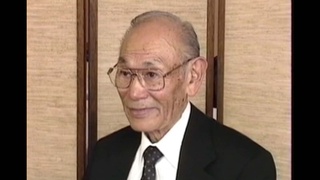Interviews
Arrest of father
Three tall caucasian men were ringing our bell, so I opened the door, the living room, and they almost walked in without my…I just opened door a little but they came in, and they pulled out a…uh, I didn’t know at first what it was…but it was a FBI card.
--And then they said, “Does Seiji Nakahara live here?”
--And, I said, “Oh yeah” but I said, “He’s very sick. He’s sleeping in the back.”
And then, they came right in and went to the bedroom and woke him up and told him put on his bathrobe and slippers and they rushed him right out. I didn’t have time to even ask, “Where are you taking him?” or “What’s this all about?” And so, they took him, and I called my mother who was just down the street at my aunt’s and told my mother, “Come home right away. Somebody just took pop.”
Date: June 16, 2003
Location: California, US
Interviewer: Karen Ishizuka, Akira Boch
Contributed by: Watase Media Arts Center, Japanese American National Museum.









